Germline Mutation Detection in Cancer
Germline Mutations and Cancer Predisposition
Germline mutations, also called hereditary mutations, are passed on from parents to offspring. Inherited germline mutations play an important role in cancer risk and susceptibility. Knowledge of these hereditary mutations can lead to the development of preventive measures to reduce the likelihood of developing cancer.
Inherited mutations associated with hereditary cancer risk can be analyzed through various approaches, including next-generation sequencing (NGS) and microarrays.
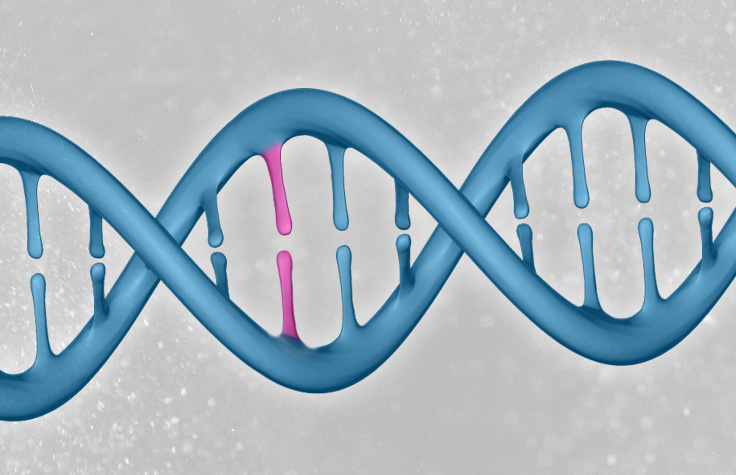
Sequencing to Identify Cancer-Associated Germline Mutations
NGS methods enable researchers to rapidly sequence known or suspected hereditary cancer risk-related genes. NGS can detect large numbers of germline mutations at once and/or identify novel germline variants linked to cancer.
Whole-genome sequencing provides a comprehensive picture of germline mutations across the entire cancer genome. Targeted sequencing studies use hereditary cancer panels to assess only the genes that have known associations with cancer predisposition, reducing sequencing costs and data analysis burdens.
Germline Mutation Linked to Familial Melanoma
Researchers used high-throughput sequencing to identify a germline mutation in the promoter of the telomerase reverse transcriptase gene.

NGS Workflow Finder
Take the guesswork out of your next workflow. The NGS Workflow Finder provides personalized solution recommendations and resources so you can sequence with confidence.
Find your NGS workflow todayMicroarrays for Cancer Germline Mutation Analysis
Microarrays offer an economical method for studying germline mutations in cancer. With arrays, hundreds of thousands of known single nucleotide polymorphisms (SNPs) can be studied across large sample sets simultaneously.
These studies can provide insight into genetic risk factors linked to cancer as well as genotypes associated with drug response.
Development of a Cancer Genotyping Array
This Nature Genetics article discusses the development of the iCOGS array, commercialized as the Infinium OncoArray, for hereditary cancer risk assessment research.
Hereditary Cancer Risk Research Articles

Predicting Cancer Risk
Researchers at City of Hope use NGS to understand the polygenicity of cancer and perform hereditary cancer risk assessment studies.
Read Article
The Changing Landscape of NGS Implementation in Molecular Diagnostic Laboratories
Key opinion leaders discuss the ongoing challenges and potential of NGS in oncology testing.
Read Article
Exploring the Genetic Basis of Oral Cancer
Researchers identify a variety of genomic alterations, including germline mutations, that may influence a deadly oral cancer.
Read ArticleBringing Oncology-Based Genetic Testing to Latin America
Sandra Balladares, Ph.D., Global Marketing Manager at Illumina and breast cancer survivor, describes her efforts to bring genetic testing to Hispanic cancer patients in Latin America and educate local healthcare officials about hereditary cancer risk assessment.
Read Article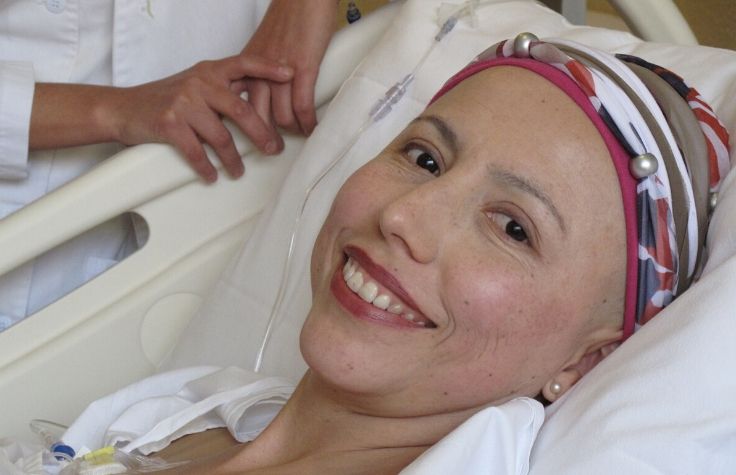
Featured Sequencing Products
Germline mutations that might predispose individuals to cancer can be studied through various approaches, including targeted sequencing.
Researchers can focus on specific genes of interest using predesigned hereditary cancer gene panels, or develop their own custom targeted sequencing panels.
Click on the below to view products for each workflow step.
Expert-defined research panel targeting 113 genes associated with genetic cancer risk predisposition.
AmpliSeq for Illumina BRCA PanelTargeted research panel investigating somatic and germline variants in BRCA1 and BRCA2.
Create amplicon panels optimized for content of interest with our free, user-friendly online tool.
The smallest, most affordable Illumina sequencer. Enables targeted or small genome sequencing in any lab.
MiniSeq SystemA simple, affordable solution for low-throughput targeted sequencing.
MiSeq SystemFocused power. Speed and simplicity for targeted and small genome sequencing.
MiSeqDx System (in Research Mode)First FDA-regulated, CE-in vitro diagnostic (IVD) marked, NGS platform designed specifically for the clinical laboratory environment. Also runs in research mode.
Flexible sequencing and BeadChip array scanning on a single instrument.
NextSeq 550Dx Instrument (in Research Mode)FDA-regulated, CE-in vitro diagnostic (IVD) marked, high-throughput NGS platform that also runs in research mode to enable clinical research.
NovaSeq 6000 SystemScalable throughput and flexibility for virtually any genome, sequencing method, and scale of project.
Rapid analysis of germline variants from NGS data.
BaseSpace Variant InterpreterA powerful variant analysis and reporting tool that enables researchers to identify and classify disease-relevant variants quickly, and then report significant findings in a structured format.
Simple, secure, flexible NGS data analysis and management.
Illumina DRAGEN Bio-IT PlatformThe Illumina DRAGEN (Dynamic Read Analysis for GENomics) Bio-IT Platform provides ultra-rapid secondary analysis of NGS data.
Polygenic Risk Scores to Better Understand the Heritable Risk of Disease
A polygenic risk score represents an approximation of an individual’s genetic risk for disease, based on the sum of the risk alleles for a disease trait, relative to the population.
Learn More About Polygenic Risk Scores
Featured Microarray Products
Infinium OncoArray-500K BeadChip
Comprehensive, high-density array for interrogating ~500,000 genome-wide SNPs associated with cancer risk.
View ProductInfinium iSelect Custom Genotyping BeadChips
Design your own custom genotyping panels for interrogation of up to 1 million markers (SNPs, indels, and CNVs).
View ProductGenomeStudio Software
Visualize and analyze data generated on Illumina microarray scanners.
View SoftwareIdentifying Sarcoma-Associated Germline Variants
Garvan Institute researchers used NGS with hereditary cancer gene panels to investigate the genetic determinants of early onset sarcomas. Their studies revealed rare cancer-associated variants in the germline. Their next steps include whole-genome sequencing to gain further insights into sarcoma risk.
Read Interview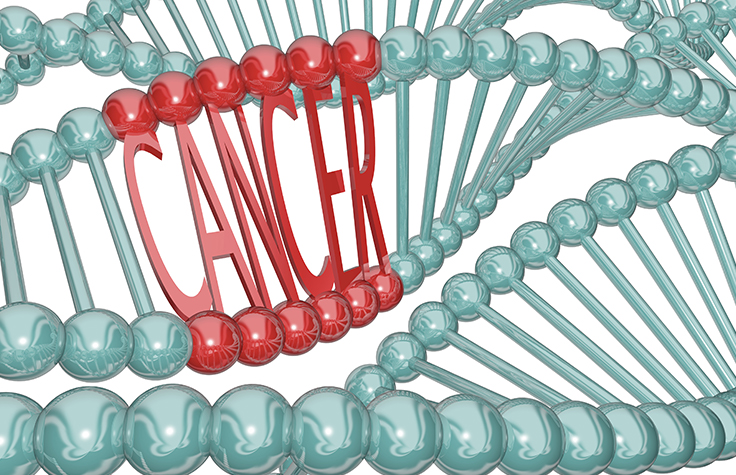
Related Methods
Targeted Cancer Sequencing
Focus on a set of known genes associated with cancer predisposition.
Learn MoreCancer Whole-Genome Sequencing
Get a comprehensive view of the genomic alterations present in tumor tissue, including novel germline variants.
Learn MoreMicroarray Analysis
Offering flexible content and scalable multiplexing, our microarrays enable diverse applications.
Learn MoreLearn More
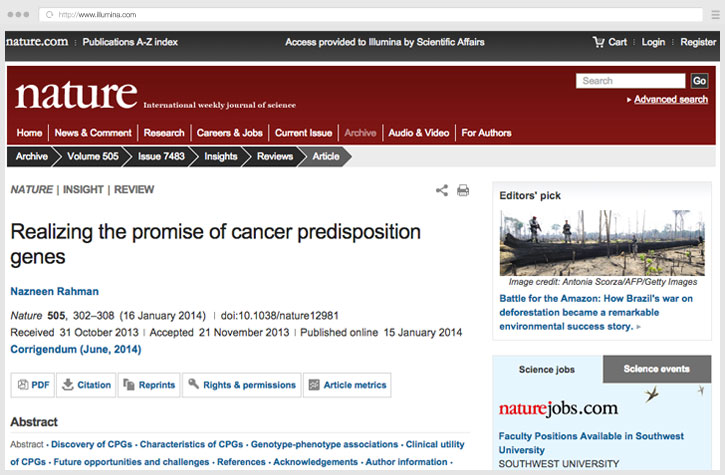
The Promise of Cancer Predisposition Genes
Dr. Rahman reviews characteristics of known cancer risk-associated genes and potential prospects of future discoveries.
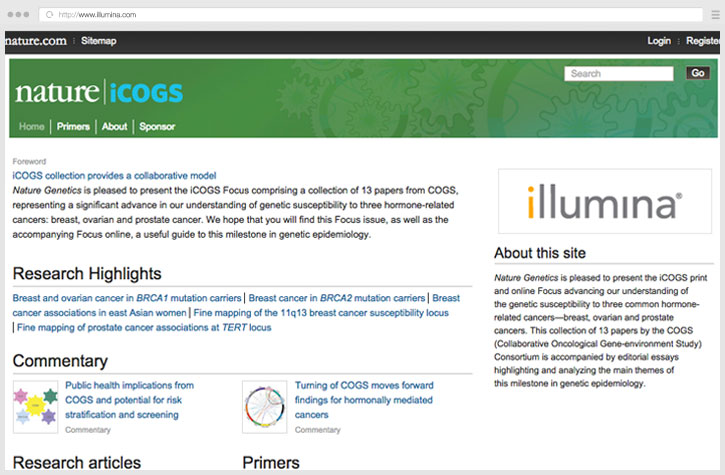
A Collaborative Model for Cancer Risk Studies
These Nature Genetics papers focus on advances in understanding genetic susceptibility to hormone-related cancers.